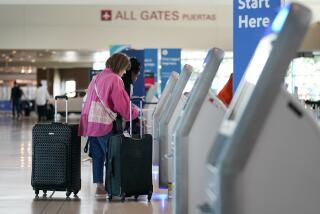ADVERTISING : High-Flying Airline Fare Claims Targeted in Test of State Power
- Share via
WASHINGTON — The newspaper ad promised “unbelievably low fares to London, or elsewhere in Europe.” For $298, TWA offered round-trip air fare from New York, plus a hotel and a rental car in London.
The ad was accurate in one sense: It was not believable, said the New York state attorney general. A ticket actually cost $321 because of surcharges, and the free hotel, which was outside of London, could be obtained only after the traveler paid for three nights’ lodging in London. The three free days’ use of the rental car was available only when the car was rented for seven days.
The ad was typical of those that anger consumers, state attorneys say. As the airline wars escalated in the late 1980s, state officials say their phones rang off the hook with gripes from outraged passengers.
Some complained that the advertised low fares were never available when they tried to book a seat. Others said the quoted fare was misleading because it did not include a series of surcharges. Still others were angry that the advertised benefits of a “frequent flier” program were not available after a traveler flew frequently with a particular airline. But state attorneys also had only one reply: Nothing could be done under state law. Certainly, the states have laws forbidding false and misleading advertisements. As Texas Atty. Gen. Dan Morales said, these laws “apply to used-car dealers, pyramid schemers and snake oil sellers,” as well as to ads for trains, buses, rental cars and hotels. But not to the airlines.
In 1989, TWA, Continental and British Airways had persuaded a federal judge in Texas to issue a nationwide order forbidding state attorneys from using their false advertising statutes against the airlines. Why? Because federal law that deregulated the airlines shields them from state regulation.
Last year, the U.S. 5th Circuit Court of Appeals affirmed that order. But the Supreme Court has agreed to reconsider the issue in the case of Morales vs. TWA, 90-1604. Arguments will be heard today.
BACKGROUND: The federal law in question is the Airline Deregulation Act of 1978. In that landmark law, Congress ended the federal government’s heavy regulation of all aspects of the airline industry, including fares. It also says “no state . . . shall enact or enforce any law . . . relating to rates, routes or services of any air carrier.” Because the ads concern airline rates, the federal law preempts any enforcement of related state laws, the 5th Circuit said.
Before the high court, both sides agree that Congress intended to give airlines broad freedom to compete, without the constraints of government regulation. But they disagree on whether lawmakers also intended to free carriers from state consumer protection measures.
Lawyers for TWA, supported by the Bush Administration, argue that airlines traditionally have been regulated solely by the federal government. Congress wanted to continue that policy, which explains the language in the 1978 law forbidding state interference, they assert.
But Morales counters that federal law does not exempt the airlines from fundamental state laws. For example, while the states cannot regulate airline safety, passengers who are injured or killed in a crash certainly can file damage suits against the airlines under state law, he notes.
The case also illustrates a phenomenon of President Ronald Reagan’s era in Washington. As federal agencies under Reagan backed away from regulating business, state officials sought to step into the breach. This case actually began in 1987 when the National Assn. of Attorneys General announced that it would set new guidelines for airline advertising. In response, lawyers for the airlines headed to the federal courts.
OUTCOME: State officials stand a good chance of prevailing in the Supreme Court. The justices have been unwilling to use “federal preemption” as a reason to sweep aside state laws unless it is absolutely clear Congress intended such a result.
The justices will closely examine the text and the legislative history of the 1978 federal law. The decision may turn on the meaning given to a relatively vague word, such as “relating.” The Bush Administration says the choice of this word shows that Congress meant to shield the airlines not only from state regulation of their fares but also from any law that touched on the subject of fares.
The state lawyers say that is nonsense. They do not want to regulate fares in any way, they say, but rather seek to ensure that the airlines tell the truth when they advertise their fares.
More to Read
Sign up for Essential California
The most important California stories and recommendations in your inbox every morning.
You may occasionally receive promotional content from the Los Angeles Times.














